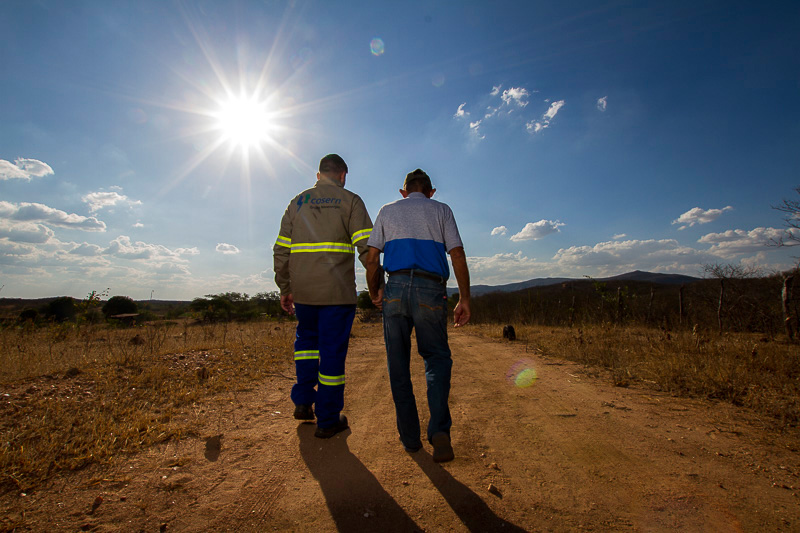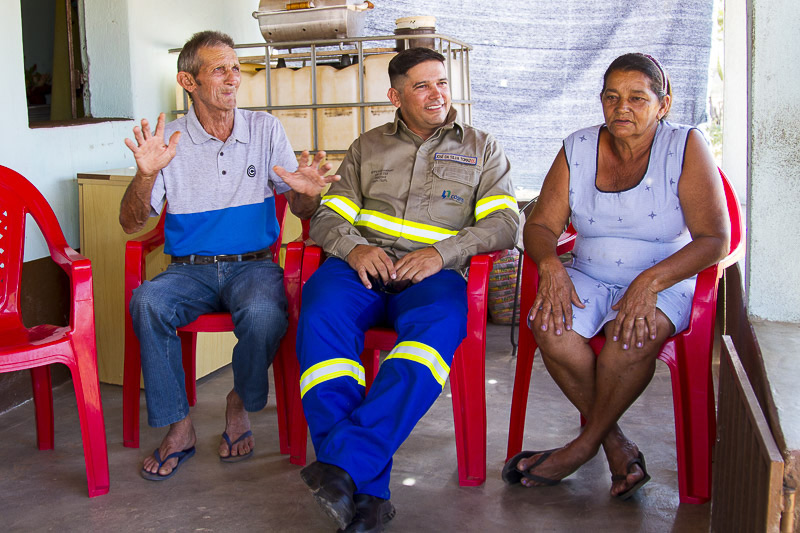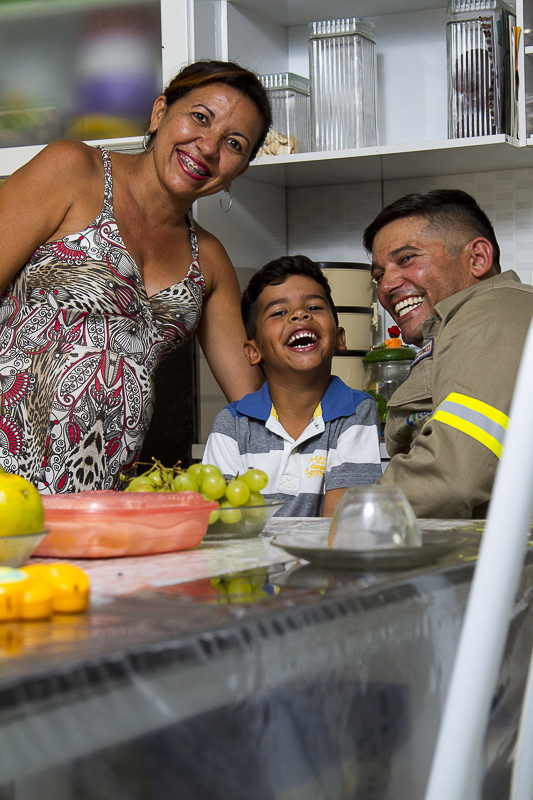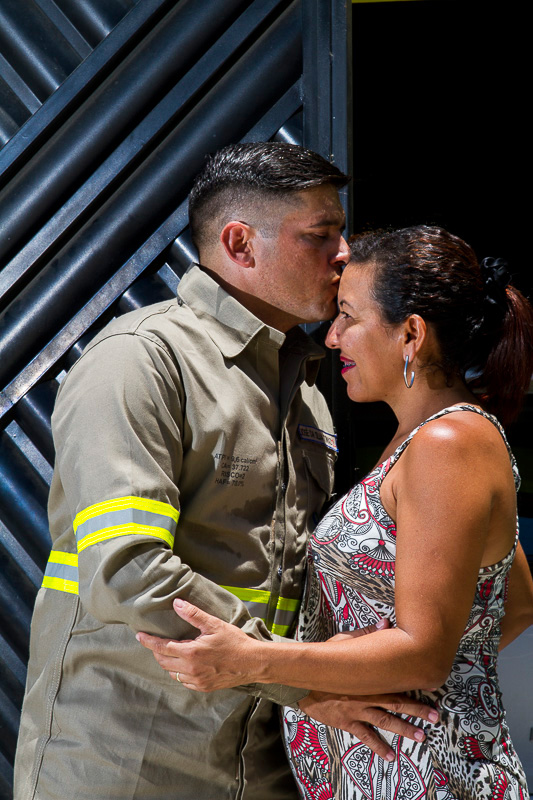- Products and Solutions

Mission Accomplished
Learn the story of José Tomaz, 34, son of Seu Antônio and Dona Cota, husband of Fátima, father of Thompson and Antony - who is still in the womb of his mother, former UN (United Nations) peace missionary in Haiti and electrician for Neoenergia Cosern.

It was December 2005 when José Silva Tomaz embarked for Port-au-Prince, the capital of Haiti, for a trip that would change his life. Sent by the UN peace mission through the Brazilian army, he was willing to give himself body and soul to that experience. And she was for the few.
Born and raised on the Molambos farm in Currais Novos, in the interior of Rio Grande do Norte, Tomaz had a happy childhood, but also a lot of effort. He woke up early and walked six kilometers with his brothers every day to school, worked on the family's plantations, and saw the army as a way to get out of the country's house, improve their lives, and learn a profession. And so it happened: he enlisted at 17 and remained a soldier for six years. That's when he volunteered for the Haitian mission in 2004 and was called to join the first peacebuilding engineering company. He went through six months of intense training in Natal and even lost eight kilos as much as the effort. Out of 516 soldiers, José Tomaz came in fourth place. “There we train for all kinds of situations, went through careful tests to participate, and many give up. The army prepares perfectly, but it also requires a lot of you,” he says.
Born and raised on the Molambos farm in Currais Novos, in the interior of Rio Grande do Norte, Tomaz had a happy childhood, but also a lot of effort. He woke up early and walked six kilometers with his brothers every day to school, worked on the family's plantations, and saw the army as a way to get out of the country's house, improve their lives, and learn a profession. And so it happened: he enlisted at 17 and remained a soldier for six years. That's when he volunteered for the Haitian mission in 2004 and was called to join the first peacebuilding engineering company. He went through six months of intense training in Natal and even lost eight kilos as much as the effort. Out of 516 soldiers, José Tomaz came in fourth place. “There we train for all kinds of situations, went through careful tests to participate, and many give up. The army prepares perfectly, but it also requires a lot of you,” he says.

The shipment took place in June 2005. Representing Brazil, Tomaz did everything in the Haitian capital: from carrying garbage in the slums to escorting authorities. “We were riding in trucks and the temperatures inside were up to 52 degrees, we acted as police officers on the streets, the pollution in the city was enormous. One of the things that touched me most there was the poverty of the place, and I saw children carrying weapons and going hungry,” she says. The soldiers slept in small containers with six bunk beds. Apart from the tension of the moment, they still needed to be bulletproof and armed 24 hours a day, even at the time of rest. The interaction was intense and the differences in culture were very great. “We needed to adapt and understand each other so as not to make our days more difficult than they already were. I can spend a year describing what I saw there and it won't even come close to what I felt,” she says.
What about the distance? It was one of the greatest sufferings. “The day that boy left I cried all day here in this window. I didn't know if he would come back, it was the worst day of my life,” says Seu Antonio, the electrician's father, pointing to the place in the house where he was staying that day. Tomaz's parents still live at the Molambos farm. During those long six months that seemed more like years to the family, communication was difficult. “We only had seven minutes a week to talk on the phone, sometimes we didn't have time to say everything. I was very homesick, says Tomaz's wife, Fatima, who was moved. Because there was a time difference, Tomaz's parents spent all this time without hearing their son's voice. “The one who passed the news to me was Fátima. It was hard, see”? , completes the mother, Mrs. Cota.
Tomaz returned to Brazil in December 2005 with one certainty: the mission was accomplished.
From his stay in Port-au-Prince he brought teachings that will guide your life forever. “This experience marked me too much. I learned that what we need to know is to deal with differences and always be humble. There I had the opportunity to live with soldiers from the Philippines, Guatemala, Nepal, and everyone, even if it doesn't seem like it, always has something to teach you. And those lessons I'm going to teach my children.”
Tomaz is the son of Seu Antonio and Dona Cota, husband of Fátima and father of Thompson and Antony (who is still in their mother's belly).
What about the distance? It was one of the greatest sufferings. “The day that boy left I cried all day here in this window. I didn't know if he would come back, it was the worst day of my life,” says Seu Antonio, the electrician's father, pointing to the place in the house where he was staying that day. Tomaz's parents still live at the Molambos farm. During those long six months that seemed more like years to the family, communication was difficult. “We only had seven minutes a week to talk on the phone, sometimes we didn't have time to say everything. I was very homesick, says Tomaz's wife, Fatima, who was moved. Because there was a time difference, Tomaz's parents spent all this time without hearing their son's voice. “The one who passed the news to me was Fátima. It was hard, see”? , completes the mother, Mrs. Cota.
Tomaz returned to Brazil in December 2005 with one certainty: the mission was accomplished.
From his stay in Port-au-Prince he brought teachings that will guide your life forever. “This experience marked me too much. I learned that what we need to know is to deal with differences and always be humble. There I had the opportunity to live with soldiers from the Philippines, Guatemala, Nepal, and everyone, even if it doesn't seem like it, always has something to teach you. And those lessons I'm going to teach my children.”
Tomaz is the son of Seu Antonio and Dona Cota, husband of Fátima and father of Thompson and Antony (who is still in their mother's belly).

**Photo credit: Maurício Cuca
